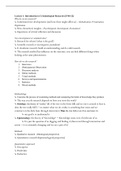Why do we do research?
↳ Understand new developments (and how these might affect us) - Globalization, Privatization,
Digitization
↳ New, theoretical, insights - Psychological, Sociological, Economical
↳ Importance of critical reflection and discussion
New development or outdated idea?
↳ Research for whom? (what is the goal?)
↳ Scientific research or investigative journalism?
↳ E. Academic research: build an understanding and do valid research
↳ The research method has influence on the outcome: you can find different things when
looking at the same phenomenon
How do we do research?
1. Interviews
2. (Participatory) Observation
3. Discourse analysis
4. Online methods
5. Visual methods
6. Surveys and questionnaires
7. Statistics
8. Mixed methods
Methodology
↳ Concerns the process of examining methods and comparing the kinds of knowledge they produce
↳ The way you do research depends on how you view the world
↳ Ontology: the theory of “reality” (E. if the tree in the forest falls and no one is around to hear it,
does the tree really fall?) → no matter what we do, reality is something that exists and we
construct on the daily basis through interaction (Thus the tree falls even if no one hears it)
↳ our goal is to understand it
↳ Epistemology: the theory of “knowledge” → Knowledge exists even if irrelevant of us
↳ It is just the question of us digging and finding it (discovered through interaction and
action → it is constantly changing and we are a part of it)
Methods
↳ Qualitative research (Ontological perspective)
↳ Quantitative research (Epistemological perspective)
Quantitative approach
↳ Descriptive
↳ Positivistic
↳ Deductive
,↳ Validity and reliability
↳ Generalizability
→ Measuring the magnitude and nature of a phenomenon; testing theory; generalization
= testing a theory
Qualitative approach
↳ Explorative
↳ Interpretive
↳ Constructivist
↳ Inductive
→ Exploratory; in-depth interviews; observations; participant observation; media research
= building an understanding of topic of interest
Mixed Methods
↳ Increasingly being used in social sciences - including criminology
↳ E. Survey + interview (picking participant to better understand their answers given during the
survey)
Criminological Verstehen (Ferrell, 1997)
↳ Immediacy and lived experience of crime
↳ Sympathetic understanding (try to understand their motives for criminal act)
↳ Share situated logic, meaning and emotion
↳ Vocabulary of motive
↳ “As all criminologists know, criminality is decided as much by legal and political authorities,
and by their strategies of criminalization, enforcement, and control, as by criminals themselves.”
Qualitative Research in Criminology
Overview of qualitative research
Cyclical or Iterative Process
↳ To step back and forth (iterative) between the stages of research, and repeat
↳ Different from the classic PTO - Problem statement - Theory - Operationalization - from abstract
to measurable observations
↳ Usually, no hypothesis
↳ The goal is not to test but to explore, understand
, ↳ Not deductive (theory to empiricism) but inductive (empiricism to theory)
↳ From theory to framework - to interpret/describe/explain data
Qualitative research designs
↳ Cross-sectional or snapshots (one moment)
↳ Comparative (meta-level and parallel studies)
↳ Longitudinal (more measurements, development)
↳ Retrospective (biography, life history, perceptions before and after intervention, historical)
↳ Case study (n = 1)
↳ Ethnographic (small groups, thick descriptions, Verstehen)
Elements of qualitative research
1. Defining the problem and the research question
2. Data collection methods
3. Sampling
1. Defining the problem and the research question
Typical subjects of criminological research
↳ Practices - drug trade, fraud, corruption, human trafficking, wildlife trade, sexual assault, scam
↳ Events - Covid, wars, a greenwashing, scandal, a data breach, a ransomware attack
↳ Interactions - offender/victim, police/citizen
↳ Roles - in (criminal) organization, families, companies
↳ Relationships - criminal, professional, law enforcement, state-corporate, pharmaceutical-medical
↳ Groups - gangs, networks, Hells’ Angels, squatters, graffiti
↳ Organizations - companies, prisons, charities
↳ Small communities - streets, neighborhoods, etnic or religious communities
↳ Social worlds - traders, artists, drivers
↳ Lifestyles and subcultures - queer scene, elite clubs, sport and social
Problem definition and research questions
↳ Literature research / information first!
↳ Investigability (empirical - ethical)
↳ Feasibility (time - money - response / access)
↳ Simple and clear
↳ Relevant (scientific, social, policy, criminology) and original
↳ Balance between focused and broad
↳ Who, What, Where, How and Why
↳ No YES-NO research questions, better open questions
↳ Be careful with Why questions (factors? motives?)
2. Data Collection Methods






